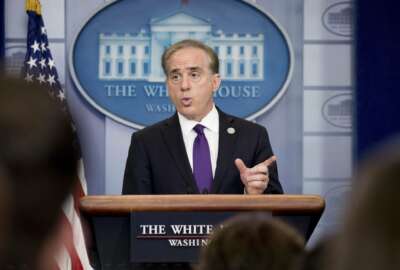
Recent court decision reminds agencies they can put indicted employees on indefinite suspension
The U.S. Court of Appeals for the Federal Circuit upheld a decision from the Merit Systems Protection Board, which said the Veterans Affairs Department could put...
The Veterans Affairs Department acted properly when it indefinitely suspended one of its employees who had been indicted on 50 different counts by a grand jury, the U.S. Court of Appeals for the Federal Circuit ruled in late December.
The court upheld a decision from the Merit Systems Protection Board, which said the department had “reasonable cause” to believe that Cathedral Henderson, a GS-13 program analyst at VA’s Health Eligibility Center in Atlanta, had committed a crime that could be punishable by imprisonment or fines.
Henderson appealed his indefinite suspension through multiple channels at MSPB, and when the agency upheld VA’s disciplinary action, he appealed to the U.S Court of Appeals for the Federal Circuit using a specific argument.
“Although Henderson does not dispute that an indictment issued by a grand jury generally constitutes sufficient cause for an agency to suspend an employee indefinitely, he contends that his indictment did not provide reasonable cause for his suspension because the VA itself ‘procured’ that indictment using ‘vague allegations,'” the case, Henderson v. Department of Veterans Affairs, reads. “According to Henderson, because employees of the VA allegedly supplied the grand jury with the testimony and evidence it considered when it returned the indictment against him, the grand jury did not act as an ‘independent arbiter of facts,’ but instead functioned ‘merely as the catspaw of the [VA.]'”
Henderson argued that he didn’t receive full due process, because the grand jury used evidence from VA — the same agency that used his indictment as the basis for an indefinite suspension — to indict him in the first place.
In July 2015, a federal grand jury indicted Henderson on 50 counts of making false statements. He ordered VA employees under his direction to close more than 2,700 unresolved authorizations for veterans when Henderson knew the department hadn’t completed those consultations, the court’s opinion reads.
Shortly after the indictment, VA informed Henderson that the department planned to suspend him for an indefinite period of time.
Henderson appealed, and VA soon issued a final notice of his suspension, noting that Henderson would remain suspended until the court completed its judicial proceedings against him. Henderson, however, appealed his suspension to an administrative judge at the MSPB, which upheld VA’s disciplinary action.
The board itself affirmed the judge’s initial decision after Henderson appealed a second time.
“The board rejected Henderson’s due process claim, concluding that the agency had provided him with adequate notice of the charges against him and a reasonable opportunity to respond to those charges before suspending him,” the court’s opinion said.
Though the court classified Henderson’s case as “precedential,” the opinion isn’t a new one, said Debra D’Agostino, a federal employment attorney with the Federal Practice Group.
“It’s long been the case that when an agency has reasonable cause to suspect that a federal employee has committed a crime … for which imprisonment could be a sentence … then the agency can indefinitely suspend you,” she said.
A convicted federal employee sits in “indefinite suspension status” while criminal proceedings continue. If he or she is cleared, the employee will typically go back to work.
Though D’Agostino said the statute determining an agency’s right to place federal employees on indefinite suspension is relatively clear, the situation becomes more complicated if an employee has been improperly indicted.
“If the person is wrongly arrested, is wrongly indicted [or] is cleared completely, they still don’t get back pay,” she said. “The government has the right to not pay them while the criminal action is proceeding, even if the whole thing is a false charge.”
In Henderson’s case, a judge found the VA employee guilty of all counts and sentenced him to 27 months in prison.
VA has long criticized MSPB for its failure to uphold the department’s disciplinary actions, yet MSPB data has consistently argued the opposite.
Both lawmakers and VA grew particularly frustrated in 2016, as they watched MSPB overturn punishments for three senior executives at the VA under the VA Choice Act.
That irritation prompted both VA and Congress to pass the VA Accountability and Whistleblower Protection Act in June. The new law eliminates MSPB as an appeal option for senior executives and gives the VA secretary the authority to remove, demote or suspend them for poor performance or misconduct
MSPB currently lacks a quorum, as the agency has one voting board member. President Donald Trump designated Mark Robbins as the vice chairman of the board. Robbins will carry out the chairman’s duties until the president names two more board members. Former MSPB Chair Susan Tsui Grundmann resigned in January after serving in holdover capacity when her term expired back in March 2016.
Copyright © 2025 Federal News Network. All rights reserved. This website is not intended for users located within the European Economic Area.
Nicole Ogrysko is a reporter for Federal News Network focusing on the federal workforce and federal pay and benefits.
Follow @nogryskoWFED
Related Stories





